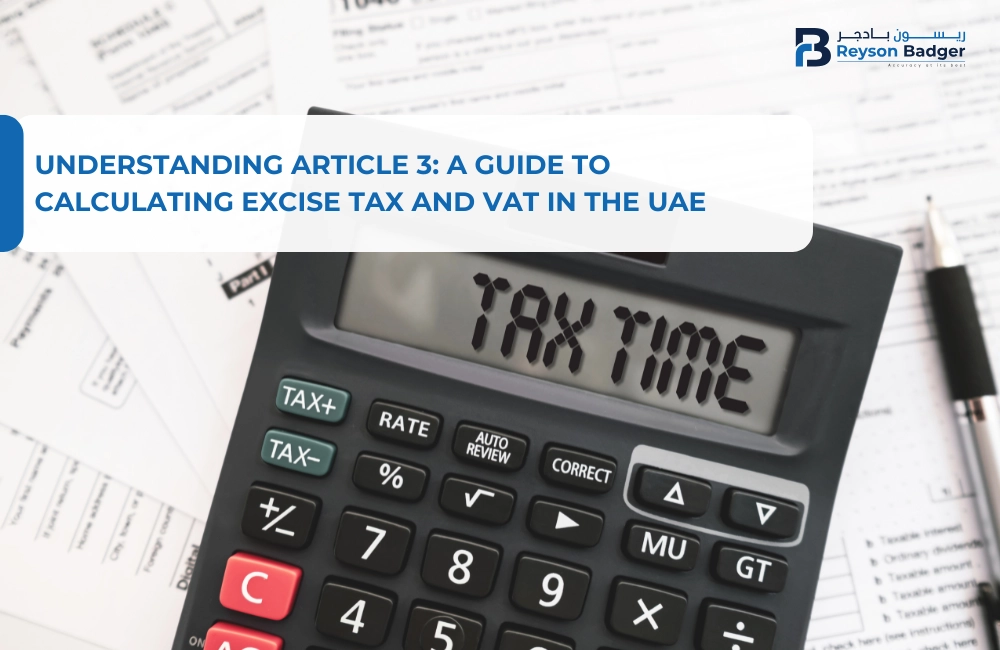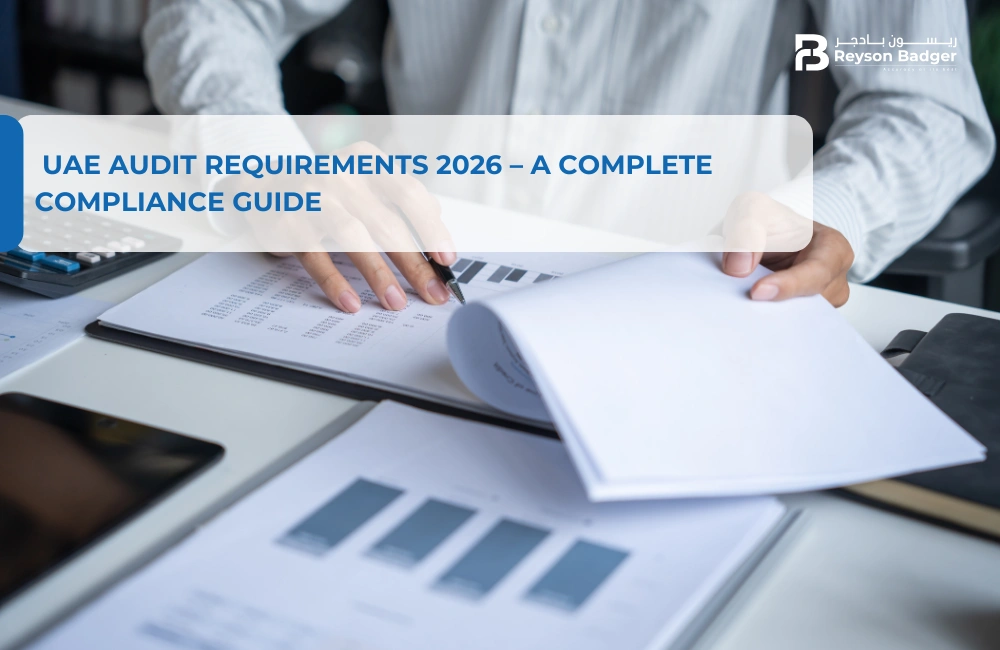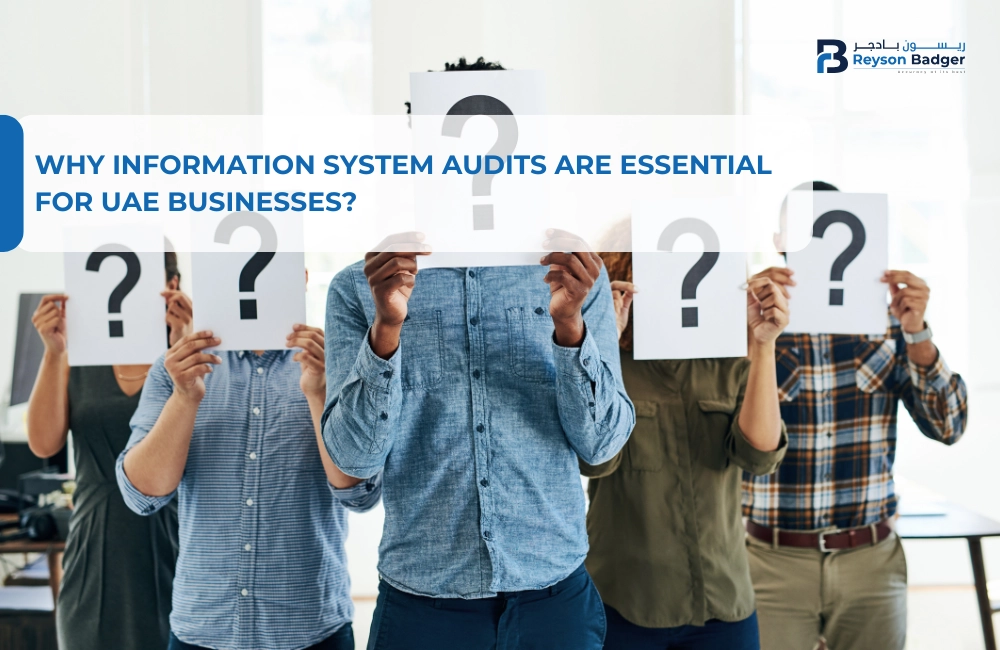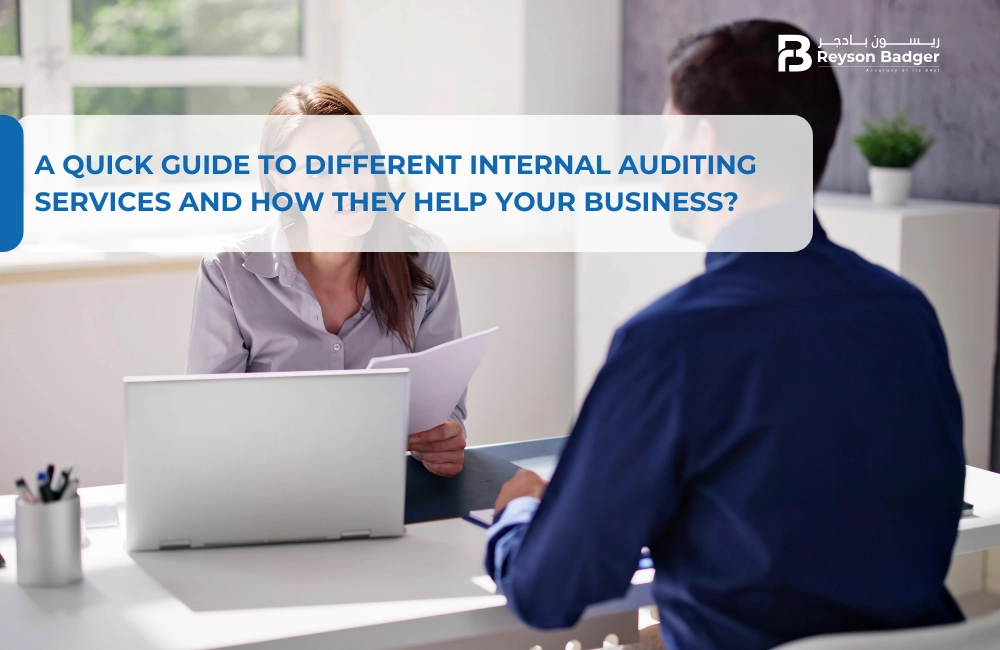Internal Audit for UAE Real Estate and Construction Companies
27-Jan-2026
Internal Audit Services in Dubai
Strengthening Governance, Risk Management, and Internal Controls
Internal Audit Services
Internal auditing is a structured process that evaluates an organization’s operations to ensure regulatory compliance, operational efficiency, and effective risk management. It plays a critical role in strengthening corporate governance, improving internal controls, and aligning business activities with UAE laws and regulations, Federal Tax Authority (FTA) guidelines, Ministry of Economy requirements, International Standards for the Professional Practice of Internal Auditing (IIA Standards), International Financial Reporting Standards (IFRS), and ISO best practices such as ISO 31000 (Risk Management) and ISO 9001 (Quality Management Systems).
Our Internal Audit Services in the UAE provide a structured and independent assessment of your organisation’s processes, systems, and internal control frameworks. We support businesses across sectors, including manufacturing, retail, professional services, real estate, construction, healthcare, and SMEs, helping them identify compliance gaps, mitigate financial, operational, and regulatory risks, and enhance performance in line with UAE corporate governance frameworks and economic substance regulations.
With Reyson Badger as your trusted internal audit firm in the UAE, you gain more than a compliance review. You receive strategic insights that support Enterprise Risk Management (ERM), strengthen governance and compliance frameworks, improve management decision-making, and promote a culture of accountability, transparency, and continuous improvement aligned with UAE regulatory expectations and international best practices.
Contact us today to discover how Reyson Badger’s Internal Audit Services in the UAE can help your business remain resilient, compliant, risk-aware, and audit-ready in an evolving regulatory and business environment

With the UAE’s evolving regulatory environment and growing business sector, the need for a strong internal audit framework has never been more crucial. A well-structured internal audit function helps businesses identify potential risks, enhance operational efficiency, and maintain compliance with industry standards, ultimately contributing to long-term success.
Regulatory Framework Governing Internal Audits in the UAE
In the UAE, internal audit services must follow a strong regulatory framework and global best practices to protect businesses and maintain trust. Key points include:
- Regulatory Oversight: Governed by the UAE Commercial Companies Law, the UAE Internal Audit Association (UAE IAA), and the ADAA (for government-related entities).
- Standards: Adhere to the Global Internal Audit Standards (IIA Standards) and the International Professional Practices Framework (IPPF).
- Compliance with Laws: Must adhere to laws like Federal Decree-Law No. (20) of 2018 on anti-money laundering (AML) and combating terrorism financing (CFT).
Key Requirements for Businesses:
- Conduct regular internal audits.
- Maintain accurate financial records and submit annual statements.
- Follow AML and CFT guidelines.
- Establish strong internal controls and governance frameworks.
By meeting these requirements, businesses help ensure integrity, transparency, and compliance in the UAE’s business environment.
Objectives and Scope of Internal Auditing
Internal auditing is an independent, systematic evaluation that assures how well an organisation manages governance, risks, and controls. The main objectives and scope include:
- Assess Governance: Internal audit services evaluate the effectiveness of governance structures, board oversight, and management responsibilities, helping strengthen policies and culture.
- Evaluate Risk Management: Ide ntify key business risks, review risk management strategies, and provide recommendations to reduce threats.
- Review Internal Controls: Assess how well internal controls work, spot inefficiencies, and suggest practical ways to improve operations.
- Ensure Compliance: Verify adherence to legal and regulatory requirements, and support organisations in avoiding compliance issues and penalties.
By covering these areas, internal audit services help businesses operate with confidence, integrity, and resilience.
Read more about why internal audit services are an essential practice for your business
Step-by-Step Process of Internal Audit Services
- Planning: Define objectives, scope, and audit criteria.
- Risk Assessment: Identify potential risks and focus areas.
- Fieldwork: Collect data, review documents, and evaluate controls.
- Analysis: Analyze findings and identify weaknesses or gaps.
- Reporting: Prepare a clear audit report with recommendations.
- Follow-up: Monitor implementation of corrective actions.
Explore the key steps of Internal Audit Services
Types of Internal Audit Services in Dubai
Businesses in Dubai can benefit from a wide range of internal audit services, including:
- Risk Management Audits: Identify, assess, mitigate, monitor, and communicate business risks.
- Compliance Audits: Ensure adherence to laws, regulations, policies, and ethical standards.
- Financial Audits: Review internal controls, detect fraud, verify financial statements, and provide clear reports.
- Operational Audits: Evaluate performance, cost management, quality, and process efficiency.
- IT Audits: Assess information security, IT infrastructure, application controls, and governance.
- Governance Audits: Review corporate governance, strategic planning, risk management, and ethics.
- Environmental Audits: Check environmental risks, compliance, sustainability, and green initiatives.
- Fraud Audits: Identify, prevent, detect, and investigate fraud, with clear reporting.
- Quality Audits: Evaluate quality systems, product quality, suppliers, and improvement opportunities.
- Health and Safety Audits: Ensure compliance with safety laws, assess workplace risks, and improve safety culture.
Discover the different internal audit services and how each one adds value to your organisation
Leading Internal Audit Firms in Dubai, UAE
1. Reyson Badger
Reyson Badger is a renowned audit firm in the UAE, offering accounting and auditing services to businesses of all sizes. With a strong presence in Dubai, they provide expertise in auditing, accounting, and financial advisory services .
2. HLB HAMT
HLB HAMT is a reputable auditing firm established in Dubai since 1999. They offer top-tier audit and consultancy services, including financial statement audits, management consulting, business setup, VAT compliance, and IT consulting .
3. PKF UAE
PKF UAE is a leading audit firm in Dubai, providing a range of services including auditing, accounting, tax advisory, and business consulting. They are recognized for their expertise in serving various industries, including real estate, hospitality, and healthcare.
4. Crowe UAE
Crowe UAE is a prominent audit firm in Dubai, offering audit, tax, and advisory services to businesses. They have a strong reputation for providing high-quality services, with expertise in serving various industries, including financial services, manufacturing, and technology .
5. CDA Audit
CDA Audit is a leading audit firm in Dubai, providing quality auditing, accounting, and business consulting services. They have a team of seasoned chartered accountants and experts in auditing and accounting, offering tailored solutions to meet clients' specific needs.
Industry-Specific Internal Audit Considerations
Financial Services
- Regulatory Compliance: Ensure adherence to financial regulations, such as anti-money laundering (AML) and know-your-customer (KYC) requirements.
- Risk Management: Evaluate the effectiveness of risk management practices, including credit risk, market risk, and operational risk.
- Internal Controls: Assess the design and operating effectiveness of internal controls, including those related to financial reporting and asset safeguarding.
2. Healthcare
- Compliance with Healthcare Regulations: Ensure adherence to UAE healthcare regulations, such as Federal Law No. 2 of 2019 (Health Data Law) and MOHAP/DHA standards.
- Patient Data Protection: Evaluate the effectiveness of controls related to patient data protection and confidentiality.
- Medical Records Management: Assess the accuracy and completeness of medical records and evaluate the effectiveness of records management practices.
3. Real Estate
- Compliance with Real Estate Regulations: Ensure adherence to real estate regulations, such as those related to property development and sales.
- Property Valuation: Evaluate the accuracy and reasonableness of property valuations and assess the effectiveness of controls related to property valuation.
- Lease Management: Assess the effectiveness of lease management practices, including lease administration and rent collection.
4. Manufacturing
- Compliance with Manufacturing Regulations: Ensure adherence to manufacturing regulations, such as those related to product safety and quality.
- Supply Chain Management: Evaluate the effectiveness of supply chain management practices, including procurement, inventory management, and logistics.
- Product Quality Control: Assess the effectiveness of product quality control practices, including inspection and testing.
5. Retail
- Compliance with Retail Regulations: Ensure adherence to retail regulations, such as those related to consumer protection and product safety.
- Inventory Management: Evaluate the effectiveness of inventory management practices, including inventory valuation and stock replenishment.
- Point-of-Sale (POS) Systems: Assess the effectiveness of POS systems, including transaction processing and sales reporting.
6. Common Industry-Agnostic Considerations
- Cybersecurity: Evaluate the effectiveness of cybersecurity controls, including those related to data protection and network security.
- Data Analytics: Assess the effectiveness of data analytics practices, including data governance and business intelligence.
- Internal Controls: Evaluate the design and operating effectiveness of internal controls, including those related to financial reporting and asset safeguarding.
Benefits of Internal Audit Services
- Improves operational efficiency by identifying process gaps and optimising resource use
- Strengthens risk management through early detection of financial, operational, and compliance risks
- Ensures regulatory compliance, reducing exposure to penalties and legal issues
- Enhances financial accuracy by detecting errors, inconsistencies, and potential fraud
- Builds stakeholder confidence through transparent and well-governed operations
Professional Internal Audit Services support better decision-making, stronger controls, and sustainable business growth.
Learn more about the benefits of Internal Audit Services for UAE businesses
Internal Audit Co-Sourcing and Outsourcing in UAE
Businesses in the UAE can adopt internal audit co-sourcing or internal audit outsourcing based on business size, regulatory complexity, and internal capabilities. Both models support strong governance, effective risk management, and compliance with UAE laws and international standards.
Internal Audit Co-Sourcing
- Collaborative model between the in-house audit team and external experts
- Internal audit control remains with management and the audit committee
- External specialists support areas like IT audits, corporate tax, AML, ESG, and risk management
- Enables skill development and knowledge transfer
- Flexible and scalable based on audit needs
- Best for medium and large organisations with existing audit teams
Internal Audit Outsourcing
- An entire or major part of an internal audit is handled by an external audit firm
- Independent planning, execution, and reporting of audits
- Cost-effective solution for SMEs and growing businesses
- Ensures compliance with IIA Standards, UAE corporate governance, and regulatory requirements
- Reduces internal staffing and training costs
- Best for businesses without an internal audit department
Learn about co-sourcing and outsourcing internal audit models.
Reyson Badger: Your Trusted Partner in Internal Audit Services
Reyson Badger provides Expert Internal Audit Services, helping businesses remain compliant with UAE regulations, reduce operational and financial risks, and improve overall efficiency. Our experienced internal auditors ensure that your financial records, internal controls, and company policies align with International Standards for the Professional Practice of Internal Auditing (IIA Standards), UAE corporate governance guidelines, and regulatory authority requirements, enabling your business to grow with confidence.
We offer a comprehensive range of internal audit services for businesses in Dubai, tailored to various industries including SMEs, manufacturing, trading, retail, real estate, and professional services. Our services include risk assessment, process and control evaluation, regulatory compliance checks, internal financial audits, and advisory support. We assist organizations in identifying and addressing weaknesses, enhancing operational effectiveness, and ensuring adherence to Dubai-specific compliance frameworks and federal UAE laws.
With Reyson Badger as your internal audit partner, you gain actionable insights that support risk management, strengthen corporate governance, and promote sustainable business growth in Dubai’s competitive regulatory environment.
What is the Purpose of Internal Audit Services in Dubai?
The primary purpose of internal audit services is to provide businesses with an independent and objective assessment of their internal processes, financial health, and regulatory compliance. Internal audits help organizations detect weaknesses, strengthen governance, and improve decision-making by offering valuable insights into operational and financial risks. In Dubai’s dynamic business environment, having a strong internal audit function is essential for maintaining transparency, efficiency, and long-term growth.
Learn more about the Advantages of Outsourcing Internal Audit Service .
Future Trends in Internal Auditing within the UAE(POINT WISE)
- Artificial intelligence and data analytics are integrated into advanced technologies.
- Emphasis on continuous auditing and real-time assurance.
- Growing importance of environmental, social, and governance (ESG) considerations in audit processes.
- Expansion of internal audit roles to include advisory services on strategic initiatives.
Why Choose Reyson Badger for Certified Internal Auditor Services?
Internal audit services play a vital role in ensuring compliance, managing risks, and enhancing business operations in the UAE. A well-structured internal audit function helps organizations identify inefficiencies, strengthen financial controls, and align with regulatory requirements. By investing in robust internal audit solutions, businesses can safeguard assets, maintain transparency, and drive long-term sustainable growth.
At Reyson Badger, we provide expert internal audit services in Dubai tailored to your business needs, ensuring accuracy, compliance, and operational efficiency. Get in touch with us today to strengthen your internal audit framework and take your business to the next level.
FAQs
Latest Blogs

UAE to Become Global Capital of Entrepreneurship – What it Means for Company Formation?
UAE's vision to be global entrepreneurship hub fosters innovation, attracts investors, and creates vast opportunities for seamless company formation.
READ MORE →
Who Are the Taxable Persons for Corporate Tax in the UAE?
Taxable persons for UAE Corporate Tax include mainland companies, free zone entities, and individuals conducting licensed business activities.
READ MORE →
Net Worth Certificate for UAE Visas: Investor, Family, Student & Golden Visa Requirements
READ MORE →
The Complete Guide to Ultimate Beneficial Owner Verification in the UAE
A complete guide to Ultimate Beneficial Owner rules in the UAE, UBO verification steps, compliance requirements, and how expert support can help businesses avoid penalties.
READ MORE →
Accrual Accounting vs Cash Basis Accounting: Which Is Right for Your Business?
Accounting Companies in Dubai ensures that your accounting method aligns with UAE regulations and business goals.
READ MORE →
Understanding Article 3: A Guide to Calculating Excise Tax and VAT in the UAE
This blog provides a clear guide to understanding Article 3 and how it affects the calculation of excise tax and VAT in the UAE. It explains the applicable tax rules, computation methods, and compliance considerations businesses must follow to ensure accurate tax reporting and regulatory adherence.
READ MORE →
How to Get a Net Worth Certificate in Abu Dhabi & Sharjah from a Licensed Auditor?
Learn how to obtain a Net Worth Certificate in Abu Dhabi and Sharjah, including required documents, processing time, costs, and why certification by a licensed UAE auditor is essential for visas, bank loans, and business purposes.
READ MORE →
UAE Audit Requirements 2026 – A Complete Compliance Guide
A clear overview of UAE audit requirements in 2026, covering compliance obligations, regulatory updates, and key reporting standards for businesses.
READ MORE →
The Sugar Shift: A Business Guide to the UAE’s New 2026 Tiered Excise Tax
The UAE’s new 2026 tiered excise tax introduces a structured approach to taxing sugar-sweetened beverages based on sugar content. This guide explains how the updated excise framework affects manufacturers, importers, and distributors, outlining compliance requirements, financial implications, and practical steps businesses must take to stay prepared.
READ MORE →
Financial Strength Certificate vs Net Worth Certificate - What You Need to Know
Understand the key differences between a Financial Strength Certificate and a Net Worth Certificate in the UAE. Learn which document authorities require and how professionally prepared certification from Reyson Badger can help ensure faster, compliant approvals.
READ MORE → The Federal Tax Authority (FTA) has announced that businesses must complete Corporate Tax registration within 90 days from the Date of Incorporation / MOA.
The Federal Tax Authority (FTA) has announced that businesses must complete Corporate Tax registration within 90 days from the Date of Incorporation / MOA.




